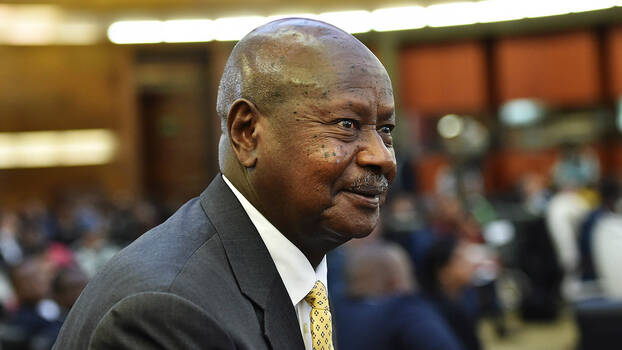
Uganda president General Yoweri Museveni was declared the winner of yet another disputed presidential election on 14 January, claiming 58.6 percent of the vote and beating his main challenger, musician-cum-politician Hon. Robert Kyagulanyi, also known as Bobi Wine, of the six-month-old National Unity Platform (NUP) with 34.8 percent. The 2021 general election, dubbed a “scientific election” owing to the fact it was held under “strict” public safety standard operating procedures due to the ongoing COVID-19 pandemic, was termed by observers as the most violent election in Uganda’s history.
Samuel Kasirye works as a Programme Manager at the Rosa-Luxemburg-Stiftung’s East African Regional Office in Dar es Salaam.
This will be General Museveni’s sixth constitutional term, and will see him extend his rule to 40 years after removing all constitutional restrictions such as term and age limits. However, this has been an election like no other, with the People Power Movement that has now morphed into the National Unity Platform stunning the ruling National Resistance Movement (NRM), as the state’s violent reaction to the outfit evidenced. One week after the election, Bobi Wine was still under what police called “preventative arrest” at his residence, with no one including family members or lawyers allowed access. Security officials claim that any public appearance of the NUP leader could lead riots similar to those witnessed in the disputed elections of 2011 and 2016.
Electoral observer reports, particularly those from the African Union and East African Community, remain muted on the gross violations that took place since the nomination of candidates and only barely make reference to concerns relating to the shutdown of the internet on the eve of election day. They note that the shutdown infringed on the freedom and right of access to information as enshrined in the Ugandan constitution, and that its field observation teams could not transmit their findings to the mission’s command centre in Kampala in time. Oddly, however, neither the European Union nor the United States deployed electoral observers. The EU Delegation stated that support for civil society, journalists, and local election observations was more critical than their involvement, although its statement nevertheless shed light on the violence that marred the process.
The United States’ statement was blunter, cancelling its diplomatic observation due to the Electoral Commission of Uganda’s resolution denying accreditation to more than 75 percent of the US observers. With only 15 approved, the United States Mission noted that it would not be able to meaningfully observe the conduct of Uganda’s elections at polling sites across the country. As a result, the United States Mission called for an audit of the presidential and parliamentary election, citing credible reports of pre-election violence and gross election irregularities. In a rebuttal, the president’s spokesman noted that Western powers had abused their influence and spun themselves into an incipient opposition outfit against the wishes of the population.
Consequently, this election augmented two key hushed narratives: firstly, that of Western interests in Uganda’s internal political processes, and secondly that of the “urban elite”. The NRM party accused the NUP leader of promoting foreign agendas, calling Bobi Wine a creation of “Western governments”, sexual minority group, and an as-yet-unnamed hostile neighbouring state. They accuse Bobi Wine of hobnobbing with divisive figures such as international lawyer Robert Amsterdam and Jeffrey Smith, director of pro-democracy NGO Vanguard Africa. The Ugandan government insists that the NUP is little more than a pawn, delivering political objectives on behalf of globalists.
The second narrative propagated by the ruling party is that NUP is a conception of an urban-based sectarian elite with its key constituency in central Uganda and the diaspora, which have no connection to the rural populations across the country. Bobi Wine countered this narrative in a TV interview before the election by insisting that the NRM clung to false narratives, violence, and intimidation in order to conceal more sinister atrocities during the campaigns. However, these perceptions linger, and Bobi Wine has been unable to eloquently respond to these charges, leading some conservative groups like the church and nationalists to break ranks with the NUP, leaving the party sequestered from some key constituencies.
A difficult road lies ahead for Uganda. Following an undecided election, the economic devastation of the COVID-19 pandemic, violence and suppression of dissent; there is growing hopelessness particularly among young people and other constituencies that have been marginalized for the last 35 years. Depending on how the existing regime reacts in the immediate future, Uganda is sitting on shifting political, social, and economic tectonic plates, and any spark is likely to lead to an upheaval if not handled well. Going forward, there are opportunities for the Left to engage with these new forces of change. More than 75 percent of Uganda's population is below the age of 30, similar to that in the region and observing from the recent on goings, civic awareness among young constituencies is growing.
However, beyond the slogans like #WeAreRemovingADictator, there are huge ideological gaps which have to be engaged through conversations bringing to the fore the urgency of maintaining and linking existing struggles. Before re-embarking on such a journey, the key questions for the Left are: what is the current context of renewed concern about political education? What are the implicit terms of political education and what education for what citizenship? What aspects of this political education make a difference in individuals’ political identity? These will require exchanges as the prerequisite for conversations, rather than the lectures which have become synonymous with Eurocentric civic education over the past 60 years. The opportunities for constructive engagement are surely there.